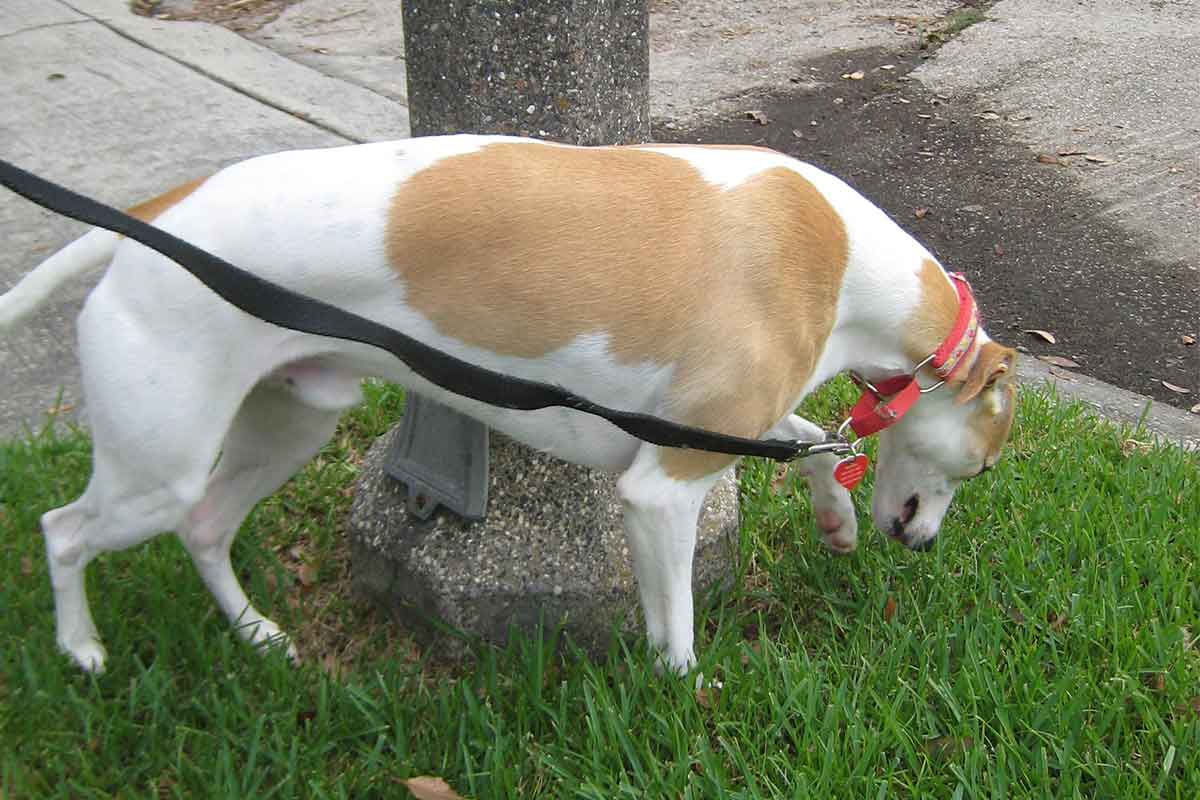Puppies learn to toddle away from their bed (usually the pile of siblings) to relieve themselves almost as soon as they have control over their bowels and bladder. It’s this instinct to not soil the nest that allows us to teach puppies and adult dogs not to relieve themselves in our nest–our home.
Sometimes, though, housetraining efforts go sideways, and not just during puppyhood. You may find puddles in the entryway or a pile in the bedroom. Here’s how to get to the root of the problem and promote better communication for housetraining harmony.
Talk To Your Veterinarian First
According to behavior experts, approximately 20 percent of canine behavior issues are related to health problems. When it comes to housetraining, that percentage may be higher. Among the health issues that could cause puppies or adult dogs to have problems holding their urine or stool are urinary tract infections, digestive upsets from food allergies, diabetes, or medication side effects.
When you take your dog to the veterinarian, provide details:
- When did the behavior begin?
- What does the urine look or smell like?
- What do the feces look and smell like?
- Where is your dog relieving himself? Is this new?
- How often do accidents occur?
- What time of day or night?
- Bring a sample of your dog’s feces with you to be checked for parasites.
Let your vet know you’re willing to talk to a trainer or behaviorist but wish to find or eliminate any health concerns first. If your dog’s health checks out fine, then you can approach this as a behavior issue.
Teenagers May Forget
If your dog learned his housetraining skills well as a puppy but at nine to 12 months of age is having accidents in the house, welcome to adolescence. Regression in training is common in adolescent dogs.
You may find urine spots, feces hidden in a back room, or leg lifting on the furniture. Don’t think just males leg lift; nope, girls may also.
Clean all the spots well using an enzymatic cleanser made specifically for urine. Did you know a black light will show up urine spots? Wait until evening, turn off all the lights, and walk your house looking for spots you may have missed. With luck, there won’t be too many.
Until his mind matures a bit more, restrict your teenage dog’s freedom in the house just as you did when he was a puppy. He can be on a leash by your side, in his crate, or in another safe management location.
Old Dogs Can Forget, Too
Geriatric dogs can also lose their housetraining skills. Older female dogs may have some incontinence issues, and both genders can develop cognitive dysfunction that causes them to lose housetraining. Health issues such as urinary tract infections, bladder stones, and kidney problems can also cause a lapse in housetraining skills.
Geriatric dogs who show housetraining issues should visit the veterinarian for a thorough examination. Your vet will probably recommend bloodwork to see what’s going on. Other tests may be recommended as well.
Meanwhile, don’t punish your old dog for lapses. To prevent accidents, use a belly band for males and diapers for females. Both of these use a pad to catch urine, which will protect your floors and furnishings. Introduce each of these accessories with a happy voice, a handful of treats, and lots of praise and petting. Check and change belly bands and diapers regularly for your dog’s comfort.
When You’re Gone Too Long
If your dog has accidents while you’re away from home for a number of hours, you are probably asking him to hold it too long. Although some dogs can and often do hold their bowel and bladder for many hours, that doesn’t mean all dogs can do it or even that it’s healthy for them to do so.
Most adult dogs can reasonably go all morning and then all afternoon if they get a good break at mid-day. If you can, go home at noon to let your dog out, or try to enlist another family member or a neighbor for potty duty.
Many dog owners hire a dog walker or pet sitter to give their pets a mid-day break. How often depends on your dog’s needs and your budget. Puppies and geriatric dogs may need more frequent visits.
Other Accidents
With other housetraining accidents, play detective. Where did your dog go? When? Look at the situation from your dog’s point of view. Was it snowing or raining outside? Was there a lot of noise outside? Were you and your dog playing inside and he didn’t want to leave a good time?
When you have answers to these questions, you can figure out how to can make sure this doesn’t happen again.
This article was reviewed/edited by board-certified veterinary behaviorist Dr. Kenneth Martin and/or veterinary technician specialist in behavior Debbie Martin, LVT.








